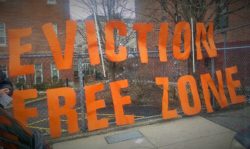 Boston Residents are putting a human face on displacement to fully understanding the issue. People all over Boston have stories of displacement and resistance. “Together we will share and understand the urgent need for Development without Displacement and the Emergency need for a Just Cause Eviction law to help stabilize Boston’s neighborhoods.”
Boston Residents are putting a human face on displacement to fully understanding the issue. People all over Boston have stories of displacement and resistance. “Together we will share and understand the urgent need for Development without Displacement and the Emergency need for a Just Cause Eviction law to help stabilize Boston’s neighborhoods.”
The Mayor’s Emergency bill, The Jim Brooks Community Stabilization Act, would “defend and nurture the stability of housing and neighborhoods in the city of Boston by protecting tenants against arbitrary, unreasonable, discriminatory, or retaliatory evictions, thereby maintaining diversity in Boston neighborhoods and communities while recognizing the rights of rental property owners.” Once in place, the stabilization act would advance the housing policies of the city with regard to low and fixed income persons, people of color, students, and those needing special protections.
What is the purpose of the Jim Brooks Community Stabilization Act?
The Stabilization Act is a tool to help direct legal and resource information to Boston’s tenants at risk of displacement. It would:
- Require landlords to provide a reason when seeking to evict a tenant, like failure to pay rent, damaging property, or breaking a lease. Landlords who own 6 or fewer units will be exempt.
- Require owners to notify the City of any Notice To Quit issued to tenants, improving data collection about evictions.
- The City would be required to notify the tenant of their rights under current state law.
When will the Stabilization Act take effect?
The Act must be approved by the Boston City Council and enacted by the Massachusetts State Legislature. The State Legislature has a two-year legislative cycle with the current cycle running from January 2017 through December 2018. If passed by the State Legislature, the Act would take effect in 2019, at the earliest.
Which landlords will be impacted by the Act?
Landlords who own more than 6 rental units in Boston.
Who is struggling with no-fault evictions in Boston?
While most evictions happen out of public view, here are a few stories of brave residents who are facing no-fault evictions and major rent increases. Click on the link for an interactive map with videos and stories at bostondisplacement.org.
An issue for working class communities in Boston
- Wages have remained stagnant and the income inequality gap increases. Boston households in the top 5 percent of earners take in 15.3 times the income of the poorest 20 percent, making Boston the third most unequal U.S. city, according to a recent study by the Brookings Institution.
- 68% of Boston residents are renters, and nearly half are rent-burdened, yet wages have remained stagnant. Over 55% of renters are people of color.
- The “renter nation” is growing, with over 4,500 Boston foreclosed families in six years and most joining the rental market.
- Many homeowners, especially people of color and/or working class families, are also housing-cost-burdened and at risk of losing their homes.
- Luxury downtown and waterfront development is turning working class neighborhoods into playgrounds of the wealthy elite. For example, in East Boston the resulting pressures from development have resulted in rent increases at an average of 30% per year.
Call your district councilor and At-Large Councilors NOW- Tell them to SUPPORT AND SAY YES TO JIM BROOKS STABILIZATION ACT
AT LARGE: Michelle Wu, 617-635-3115
AT LARGE: Michael Flaherty, 617-635-4205
AT LARGE: Annissa Essaibi-George, 617-635-4376
AT LARGE: Ayanna Pressley, 617-635-4217
DISTRICT 1: Sal LaMattina, 617-635-3200
DISTRICT 2: Bill Linehan, 617-635-3203
DISTRICT 3: Frank Baker, 617-635-3455
DISTRICT 4: Andrea Campbell, 617-635-3131
DISTRICT 5: Timothy McCarthy, 617-635-4210
DISTRICT 6: Matt O’Malley, 617-635-4220
DISTRICT 7: Tito Jackson, 617-635-3510
DISTRICT 8: Josh Zakim, 617-635-4225
DISTRICT 9: Mark Ciommo, 617-635-3113
